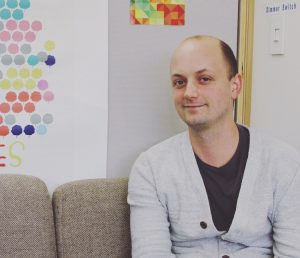In our new series, 15 Minutes with A UConn Prof, we tap into the teaching insights and tips of UConn instructors in hopes of creating a collective wisdom on college instruction.
How have your ideas of teaching changed over time?
I think one of the the biggest transformations that I made in my teaching was really appreciating the ultra high capacity lectures because of the energy that’s in that classroom. Having 400 sets of eyes on you definitely keeps you on your toes which I think actually makes you a more engaging lecturer and professor. In the small class, I often find that I can become too casual and too passive because I can actually see the students following me. That’s been one of the biggest changes for me–coming around to enjoying what I think a lot of faculty see as a detrimental thing.

It sounds like you view the lecture almost as a performance now.
I do! You could be the best teacher in the world and have a brilliant presentation but at the end of the day, if the students don’t find you interesting, it doesn’t matter.
I find myself justifying doing things like taking a break for a 2-5 minute clip, or tying in components from pop culture like movies or TV shows. I think if you look at [the clips] at face value, they’d seem out in left field but getting people to laugh or smile brings their attention back so that I can actually have them learning for the 10 minutes that follow that.
How else do you make your classes more interactive?
One of the things to recognize, especially if you’re a science teacher, is that teaching is a science and you should approach it as a science. Studies have been conducted, results have been peer-reviewed. There’s actually a lot you can learn from looking at the Scholarship of Teaching and Learning. For myself, in my small class, I’m interested in service learning pedagogy which is completely underrepresented in science.
I’ve also built in the active learning component. I’m trying Poll Everywhere. It works with cell phones, tablets, computers. I think that so far students have liked it. It’s also good for me to know what students are picking up from my lecture. Sometimes you talk and talk and talk and ask a question and no one gets it. There’s feedback for me.
Some of the feedback I get consistently is that our large class feels like a small class, and I think that’s because I started at a small school, and I don’t know how to teach in any other way than to try and engage people. I also try to be approachable. Self-deprecating humor goes a long way in teaching and in breaking down communication barriers to get people comfortable participating.
The second thing I’m starting to learn is that students need to be part of the process in order to get buy in…I say things like ‘there’s a reason why we are doing this frequent testing, and there’s a reason why I’m asking you to draw these crazy pictures of different concepts’. I’ve actually gotten them to use the term concept map, which was a big personal victory for me.
What advice do you have to upcoming instructors?
Go for it! I view teaching as a science, so you have to experiment. I think a lot of people don’t like to experiment with new things because they feel locked into a curriculum and like they have to get through this and this and that, and I think we have let go of that.
Obviously there are certain things we have to cover but you have to let go of the idea that you have to cover everything and focus more on the interactions with the students; focus more on engaging the students, and teaching the students how to think.
How much do we remember from our undergrad experience? I think ultimately what we’re trying to do is teach people how to think scientifically and how to be good learners.